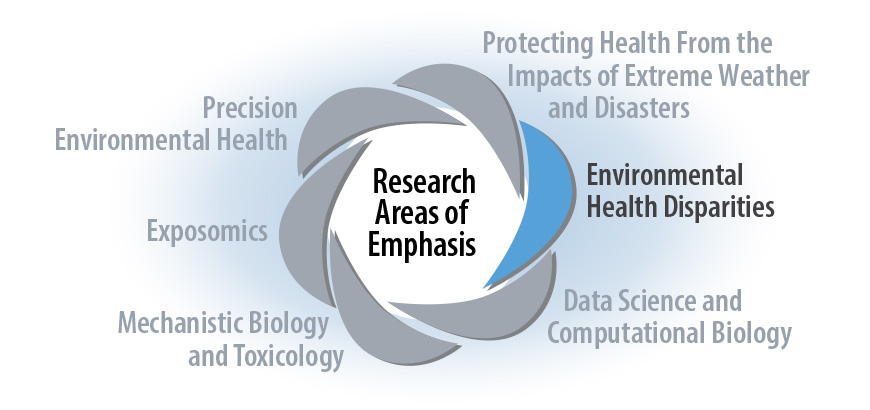Research Areas of Emphasis

Understanding the underlying causes of environmental health disparities and reducing the environmental impacts on the health of the communities who are most affected is fundamental to NIEHS’ goal of enhancing environmental health for all people.
Health disparities are differences in health status in individuals and communities that arise from a combination of factors related to social, economic, and environmental disadvantages. Exposure of communities to multiple environmental stressors over time increases the risks for environmental health disparities. The concept of health disparities must be understood in the full context of the exposome framework, including social and other determinants of health, such as housing, diet, sleep, and exercise.
NIEHS emphasizes a community-engaged research approach as part of its efforts to ensure that research findings are useful and actionable in improving the lives of people in communities affected by environmental disadvantages. NIEHS seeks opportunities to work toward understanding the biological and non-biological factors that drive disparities in environmental health impacts and enable the most effective and applicable research investments. NIEHS will harness both the approaches outlined in other sections of this plan and those listed below to advance this area of environmental health science and public health.
Translational Goal
Prioritize research to understand and address environmental health disparities and enable full application of the knowledge gained to achieving improved health.
Priority Approaches
- Employ community-engaged and community-based participatory research approaches.
- Conduct research and disseminate findings to inform the creation and implementation of effective, evidence-based health promotion and disease prevention strategies.
- Expand disaster research to assist communities in understanding and addressing exposures from natural and human-caused disasters.
- Utilize social sciences research, including health behavior, public policy, law, and economics, to inform translation of environmental health science into interventions.
Other Strategic Plan Sections

Crosscutting Themes
NIEHS is committed to collaborations and partnerships across its endeavors to successfully contribute to the critical work of NIEHS.

Capacity and Infrastructure
NIEHS research activities depend on robust investments in capacity and infrastructure to ensure readiness for their success.

Scientific Management and Stewardship
NIEHS prioritizes scientific stewardship and operational principles that align with the institute’s commitment to advancing human health and understanding the environment’s impacts on human health.


